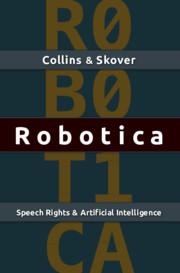
- Cited by 1
-
Cited byCrossref Citations
This Book has been cited by the following publications. This list is generated based on data provided by Crossref.
Jamil, Sadia 2023. Automated Journalism and the Freedom of Media: Understanding Legal and Ethical Implications in Competitive Authoritarian Regime. Journalism Practice, Vol. 17, Issue. 6, p. 1115.
- Publisher:
- Cambridge University Press
- Online publication date:
- May 2018
- Print publication year:
- 2018
- Online ISBN:
- 9781108649445




